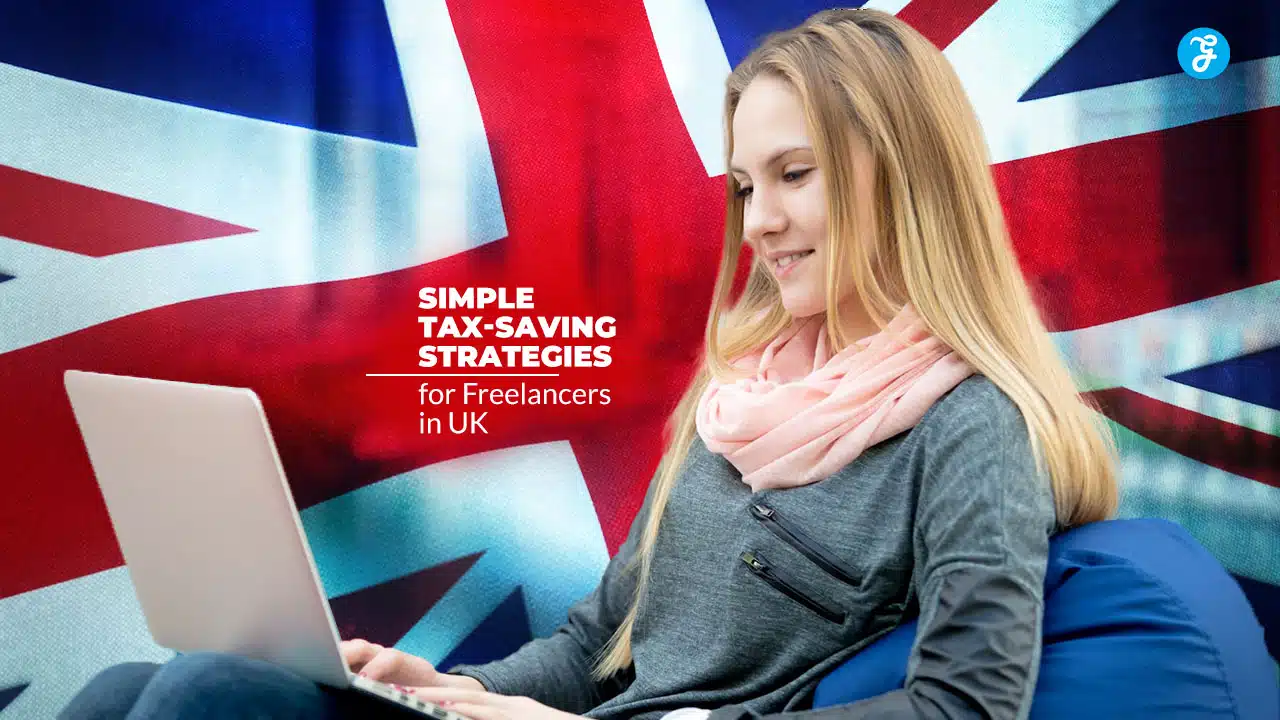Freelancing in the UK offers numerous advantages, including flexibility, autonomy, and the potential for higher income.
However, one challenge freelancers often face is managing their taxes efficiently. Unlike employees, freelancers are responsible for their own tax filings and ensuring that they pay the correct amount of tax while taking advantage of available tax-saving opportunities.
In this article, we’ll explore 10 simple tax-saving strategies for freelancers in the UK, helping you maximize your income, reduce your tax liabilities, and avoid common pitfalls.
By applying these strategies, you can optimize your freelance business for greater financial success.
10 Tax-Saving Strategies for Every Freelancer in the UK
Let’s take a look!
1. Keep Track of All Business Expenses
As a freelancer, you are entitled to claim tax relief on various business expenses, provided they are necessary for your freelance work. Keeping a detailed record of all expenses is essential for minimizing your tax burden.
Common deductible business expenses include:
- Office supplies (pens, paper, computers)
- Travel and transportation costs (train fares, mileage)
- Business-related phone bills and internet costs
- Marketing and advertising expenses
- Home office expenses, if you work from home
Tip: Use accounting software or hire a bookkeeper to ensure that every business-related expense is recorded and that you’re not missing any potential deductions. A detailed record will help you claim everything you’re entitled to and avoid overpaying on your taxes.
2. Claim a Proportion of Your Home Office Expenses
If you work from home as a freelancer, you can claim a proportion of your home’s running costs as business expenses. The key is to calculate the proportion of your home used for business purposes and claim only that portion of your expenses.
Expenses you can claim include:
- Rent or mortgage interest
- Utilities (gas, electricity, water)
- Council tax
- Home insurance
- Internet and phone bills
Example: If you use one room in your house as your office and it constitutes 10% of your home’s total area, you can claim 10% of your relevant household expenses.
Tip: Keep in mind that this applies only to the business portion of the expenses. Be sure to keep receipts and records to back up your claims.
3. Contribute to a Pension Scheme
Freelancers in the UK don’t have an employer to contribute to a pension scheme, but contributing to a personal pension is an excellent way to save for retirement and reduce your taxable income.
Why it helps:
- Contributions to a pension are tax-deductible, which means they reduce your taxable income for the year.
- The government also provides tax relief on pension contributions, adding an extra benefit.
- There’s a limit to how much you can contribute to pensions and still receive tax relief, but for many freelancers, contributing to a pension plan is a smart tax-saving move.
Tip: Research various pension schemes (e.g., personal pensions, SIPPs) to find one that aligns with your retirement goals. You can contribute up to £40,000 a year (depending on income), and if you don’t use your full allowance, you can carry it forward for up to three years.
4. Utilise the Marriage Allowance
If you’re married or in a civil partnership and one partner earns below the personal allowance threshold (currently £12,570), you can transfer part of the personal allowance to the higher-earning partner. This could reduce the higher-earning partner’s tax liability.
Eligibility criteria:
- One partner must earn less than the personal allowance threshold.
- The other partner must be a basic-rate taxpayer (earning between £12,570 and £50,270).
Tip: This allowance can save up to £252 per year in tax, and it’s available for both current and previous tax years, so don’t forget to claim it if you’re eligible.
5. Take Advantage of the Trading Allowance
The trading allowance is a simple way to save on taxes if you have small side gigs or freelance income. If your total income from self-employment is under £1,000 in a tax year, you don’t need to report it or pay tax on it. This is particularly useful for freelancers who might have occasional work that doesn’t exceed this amount.
Key Points:
- The allowance applies to income from self-employment, so it’s helpful for those who do occasional freelance work alongside a regular job.
- If you earn more than £1,000, you can still claim the allowance against your income to reduce your tax bill.
Tip: The trading allowance is automatic, so you don’t need to register it separately, but it’s essential to keep accurate records to prove your income level.
6. Consider Using the Flat Rate VAT Scheme
The Flat Rate VAT scheme is a simplified VAT accounting system that can save freelancers time and money. If your taxable turnover is less than £150,000, you can join the scheme. Under this system, you charge VAT on your invoices at the normal rate, but you pay VAT to HMRC at a flat rate based on your business type.
How it helps:
- You keep the difference between the VAT you charge and the flat rate you pay.
- This can be especially beneficial for businesses with low overhead costs and minimal VAT-registered expenses.
Tip: Make sure you consult with a VAT advisor before choosing the Flat Rate VAT scheme, as it’s not always the best option depending on your business’s financial situation.
7. Keep Your Salary Below the Higher Tax Rate Threshold
As a freelancer, one common tax-saving strategy is to structure your income in a way that minimizes the amount of tax you pay. In the UK, income between £12,570 and £50,270 is taxed at the basic rate of 20%. Any income above this is taxed at the higher rate of 40%.
If possible, aim to keep your taxable income below the higher-rate threshold, which may involve balancing your freelance income with pension contributions or other tax-deductible expenses.
Tip: Speak with a financial advisor to develop strategies for managing your taxable income, particularly if your earnings fluctuate from month to month.
8. Claim Capital Allowances on Business Equipment
If you purchase expensive equipment or assets for your freelance business (such as computers, machinery, or furniture), you may be able to claim capital allowances. This allows you to deduct the cost of these assets from your taxable income, reducing the amount of tax you owe.
Types of equipment eligible for capital allowances:
- Computers, laptops, and other office equipment
- Furniture and office supplies
- Vehicles (if used for business purposes)
Tip: Ensure that the equipment is genuinely used for business purposes, as you cannot claim allowances on items used privately.
9. Use an Accountant to Maximize Deductions
Hiring an accountant can be a smart move for freelancers, particularly if you are unfamiliar with the nuances of tax laws and available deductions. Accountants can help ensure you are claiming all eligible tax reliefs, maximizing your allowable expenses, and filing your returns correctly.
Benefits of hiring an accountant:
- Expertise in identifying tax-saving opportunities
- Reduced risk of errors or missing deadlines
- Time saved on handling the tax process
Tip: Choose an accountant who specializes in working with freelancers or self-employed individuals, as they’ll have a better understanding of the specific tax challenges you face.
10. Take Advantage of R&D Tax Credits
If your freelance business involves innovation or technological development, you may be eligible for Research and Development (R&D) tax credits. These credits are designed to encourage businesses to invest in innovation, and freelancers working in fields like software development, engineering, or scientific research may qualify.
How it works:
- If you qualify, you can reduce your Corporation Tax bill or receive a cash rebate from HMRC.
- The criteria for R&D tax credits are relatively broad, so even small businesses or freelancers may be eligible if they’re working on innovative projects.
Tip: Consult with a tax expert or accountant to determine if your freelance work qualifies for R&D tax credits.
Takeaways
Freelancing in the UK can be financially rewarding, but it’s essential to stay on top of your tax obligations.
By applying these 10 simple tax-saving strategies, you can reduce your taxable income, maximize your deductions, and ensure that you’re paying only what’s necessary.
Whether you’re keeping track of your business expenses, contributing to a pension, or utilizing tax allowances, every strategy can help you save money and reinvest in your freelance business.
Make sure to consult with a qualified accountant to tailor these strategies to your unique business situation, as this will ensure that you take full advantage of the available tax-saving opportunities. With careful planning and a strategic approach, you can make 2025 a financially successful year for your freelance career.









































